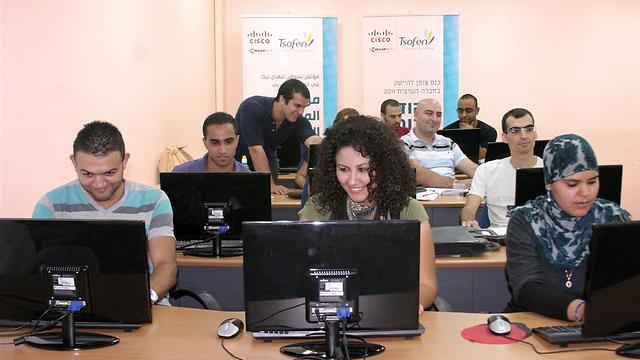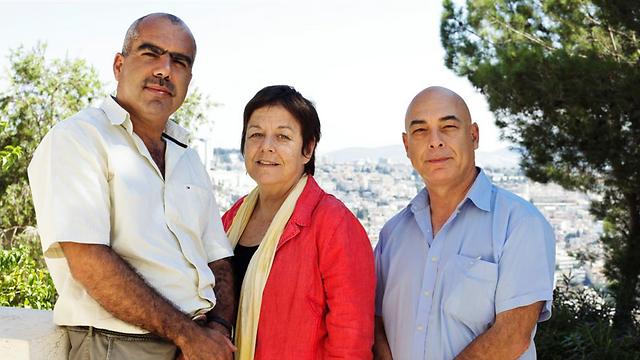
Only 1,200 Arabs in high-tech? How to make a change
Tzofen helping to revolutionize high-tech industry through goal of advancing establishment of industrial centers in Arab cities
Every year, thousands of Arabs are graduating from exact-sciences, but in the high-tech industry they represent a minimal 1.5 %, with just about 1,200 workers. With that, this is an improvement compared to the status of the last five years, when the number of workers was only 350. These statistics are from the organization Tzofen, an Arab high-tech job placement company, which revealed its activities for promoting the high-tech industry within the Arab population.
Tzofen was founded in 2008 in Nazareth by three social entrepreneurs: Smadar Nahav and Yossi Kutan, high-tech businesspeople, and Sami Saadi, an accountant. The organization's activities include the development of the high-tech industries in Arab cities, while finding and training exact-science gradates from the Arab population that aren't currently working in a career that suits their skills.
This year, the organization started working in the 'Triangle', the group of Israeli-Arab towns and villages in the center of Israel adjacent to the West Bank, and has opened a new center in Tira.
As of today, the center in Nazareth offers three training courses throughout the year, and last September the first course concluded in Tira. Tzofen is responsible for 280 job placements in leading companies and advancing the high-tech industry in Nazareth through partnerships with leading companies in the field, such as Amdocs, which opened a large branch in Nazareth's new industrial area.
"We paid attention to the goal of integrating thousands of Arab academic into the high-tech industry, and, in particular, to develop and advance the advanced-technology field within Arab society," Hadas Nahav said, co-CEO and co-founder of the organization.
"I call it the 'Center of Computing and Information Systems' for Arabs. We do training sessions of three to five months, in which we give an experience resembling an internship or an equivalent experience to Arab academics who finished their university studies."
Roni Ploman, a volunteer in the organization and an advisor for start-up companies, says he sees in the high-tech field a potential to better the socio-economic situation of the Arab population in Israel, which suffers from high poverty rates and a low participation rate in the workforce, in particular women.
"There are two economies in Israel," she said. "Our model works on the supply principle by providing workers to the industry and creating demand through the establishment of company branches in industrial area and advancing the start-up field. There is a lot of conscious and unconscious discrimination, but for now there is a lot of momentum and interest from government offices as well."
Judging by the organization's data, its activities are a success. Today there are 12 high-tech companies in Nazareth, compared to one in 2008, and 400 Arabs are employed in the industry in Nazareth in comparison to 30 in 2008. The organization is proud of the multiple logos of the high-tech companies on the growing number of leased cars in the city streets.
"Something changed in Nazareth's economy," Ploman said. "Young people can learn software engineering because there is a possibility to find work, and start-up companies are beginning to pop up. Our vision is for there to be thousands of Arabs in the high-tech industry in Arab cities, with an emphasis on women workers. We're saying that if men aren't working in the profession – then women, educated ones even, aren't working at all."
'Good Intentions'
Despite all this, there still are many roadblocks to integrating the young generation of Arabs into the industry, such as discrimination and culture gaps, for example the lack of familiarity with the world of job interviews. For instance, in the book "Good Intentions," which Ploman wrote about the organization's activities, she illustrates how the interviewees came to the interview with their brother or mother or father.As well, the organization also stresses the lack of Arab industrial areas in Arab jurisdictions in general, and specifically the absence of high-tech industrial areas. The result, according to the organization's statistics, is that about 44% of Arab men who learned a science-related profession are employed as teachers.
"The goal is that high-tech will be the locomotive for the growth of Arab society and that the Arabs will take part in relation to their percentage of the population, 20%," Nahav said. "In order to do that it's necessary to establish the industry close to home. In Nazareth, for example, 50% of the additional manpower comes from the city."
Nahav, a high-tech businesswoman with a resume rich in founding and managing start-up companies and in organizational advice for companies, said that in order to change the situation it's necessary to show that it's worthwhile economically. "When we founded Tzofen we presumed that if we'll reach an additional thousand engineers it will work for it itself because of the method of 'friend bring a friend,'" she said. "We past that target but we didn't think it would happen."
Sami Saadi, co-CEO and part-founder of the organization, a private accountant and internal auditor of non-profit organizations and companies, said that "it's necessary to create demand. A lot of people studied, returned to their villages in the Galilee and didn't find work. One of the main reasons is because there aren't industrial areas and they were forced to find other channels. This led to the situation where a young Arab doesn't recognize the high-tech culture at all. A lot learned medicine, because in order to be a schoolteacher one doesn't have to learn sciences."
Winds of Change
Yitzhak Danzinger, chairman of the software service company Galilee Software, said the company was founded in Nazareth six years ago by senior high-tech people, with the pronounced goal to provide jobs to academic Arabs. Today, the company employs about 160 engineers from the Arab sector. "We decided to change the paradigm," he said. "Today, whoever uses our company has no problem finding work in any leading company that they want.
"There were hundreds of isolated engineers in Israeli high-tech, all from the small upper social class and exceptional students from the Technion" he said. "Because there wasn't a clear employment horizon, stand-out students went to study medicine and not computer science or electronic engineering. On the other hand, we saw that there is a high-tech industry that sends jobs outside of Israel, particularly to India and Eastern Europe and the companies are suffering from this because of culture gaps, large expenditures and low production rates."
Danziger also said that the location of the company was chosen because of the potential for manpower, but he made it clear that in order for other companies to come to the area there must be an improvement in the establishment of infrastructure. "Road 6 changed the picture for Yokneam," he said.
Mohammed Tahar, a senior engineer at Intel, said a change is happening in the outlook of the next Arab generation. "There is a start, but it's not enough, particularly in smartphone application development. We haven't reached software development. It’s a dream but it's not the reality. There still is fear and a high drop-out rate in the Technion in the first and second semesters."
As of today, there are only two industrial areas in the Arab sector: in Nazareth and in Kfar Qassem. Abdullah Tzartzor, the manager of the Kfar Qassem area, said that the winds of change to establish the industrial park began with the establishment of the industrial area in Rosh Ha'ayin in the center of the Arab community. The idea made its way to the neighboring city, of course.
The industrial area is a logistic-commercial park that requires a relatively small amount of workers. This isn't Tzofen's vision – which wants to become an industrial area abundant with workers. Nayal Ovadai, one of the entrepreneurs of the industrial area, said its establishment was accompanied by a lot of difficulties. "Kfar Qassem's model succeeded because of the external capital fundraising and a private entrepreneur," he said. "There was complete imperviousness on the topic. There were good intentions, but that's not enough. There were lots of obstacles in all that was related to the planning."
Rassem Natar, a Ministry of Industry expert for industrial area development in Arab cities, said the government approved the plans for the development of industrial areas in Arab cities in Israel, including in the Israeli Arab villages of Qalansawe, Ar'ara and Umm al-Fahm. "The initiative needs to be from the Palestinian Authority or the Civil Administration, but the government saw that it's not working and took it upon itself to plan the zoning for the PA," he said.
Natar said that the government gave benefits as part of its career track, of which there is 30% financing from the cost of employing a worker for those that employ five or more employees, and reducing the cost of developing for entrepreneurs. "These tracks are being taken," he said. As well, from the results of a State review conference that were released this week, no one from the government knows to where the 800 million NIS disappeared that were invested in order to encourage employment in the Arab sector.
Araf Kraim, director of projects at Injaz, which works to advance the local Arab authorities, criticized the authority leaders. "There are also obstructions within the local authorities themselves, either between the leaders and the professional members of staff or a lack of cooperation from the public. It's a circle that it's hard to get out of but there are winds of change – the awareness of the heads of authority is growing and becoming stronger."












